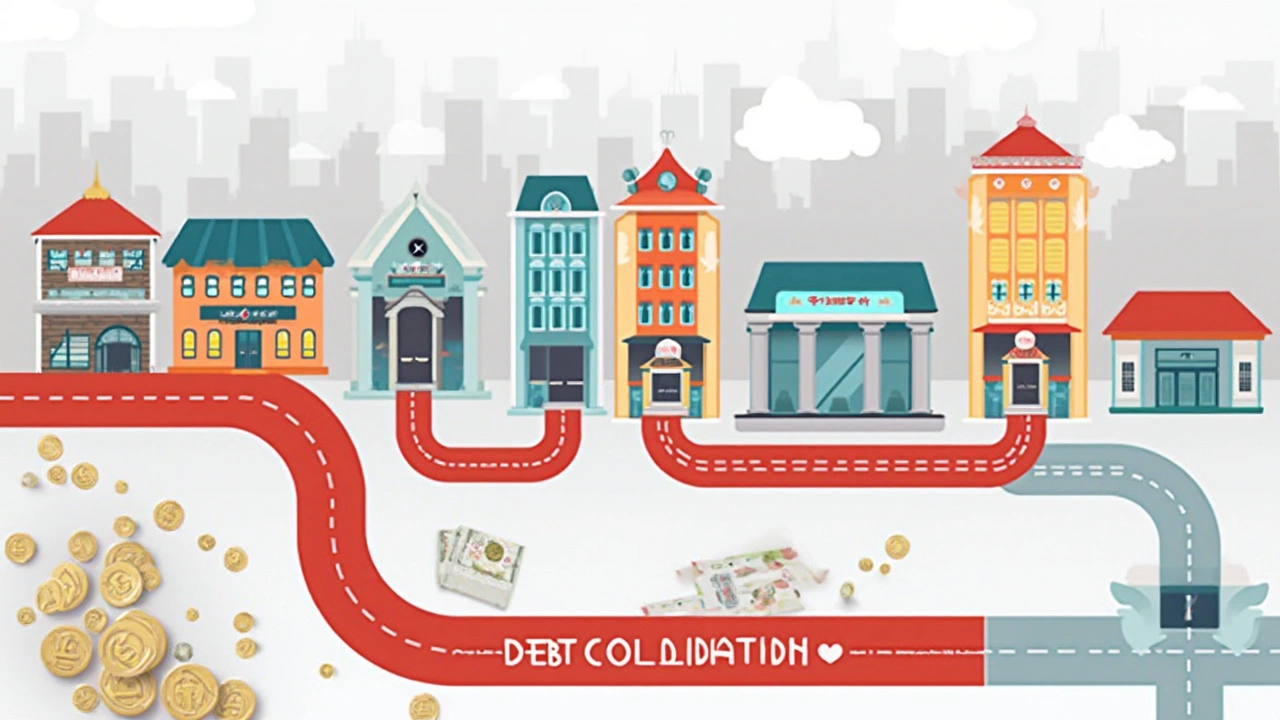Sick of juggling five bills every month? The idea of one simple payment sounds great, right? That’s where debt consolidation loans come in. But can you actually walk into your local bank and get one of these loans? Short answer: yes, but there are some strings attached.
Banks do offer debt consolidation loans, but usually, they’re just personal loans you can use to pay off other debts. Some banks might even call it a "debt consolidation loan" to make things easy to understand. But don’t expect a “special” loan only for debt. You’ll fill out a regular loan application and tell them you want to use the money to pay off debts like credit cards or medical bills.
Before you get your hopes up, banks are picky about who they hand out loans to. Your credit score matters—a lot. Got a few late payments or missed bills on your record? You’ll likely get a higher interest rate, or they might pass on your application altogether. On the other hand, if your score is solid, you’ll probably get a better rate than those flashy online lenders with their non-stop ads.
- What Are Debt Consolidation Loans?
- Do Banks Actually Offer Them?
- Bank vs. Other Lenders: What’s the Difference?
- How to Apply and Get Approved
- Tips Before You Sign the Dotted Line
What Are Debt Consolidation Loans?
Debt consolidation loans are basically when you take out one new loan to pay off a bunch of smaller debts, like credit cards, personal loans, or even medical bills. The big idea is to have just one monthly payment, usually at a lower interest rate, so you have less hassle and might save money over time. Most folks try this move so they can stop drowning in different payments with outrageous rates.
The debt consolidation loan itself is nothing fancy—it's usually just a personal loan. The money goes straight to cover your other debts, leaving you with one bill to deal with. The goal: simplify your life and maybe knock your interest down by a few points.
You can sometimes use these loans for:
- Credit card balances
- Medical bills
- Store cards
- Other high-interest personal loans
People who choose this route are often looking for a break from sky-high credit card interest—rates that the Federal Reserve reports average over 20% as of 2024. Meanwhile, debt consolidation loans from banks generally range from 7% to 15%, depending on your credit.
| Type of Debt | Average Interest Rate (2024) |
|---|---|
| Credit Cards | 20.7% |
| Bank Debt Consolidation Loan | 7% - 15% |
Keep in mind, these loans don't erase your debt—they just move it around, hopefully in your favor. You’ll need to make steady payments or you’re back to square one. People get the most out of this when they stop using high-interest credit cards after consolidating, which takes self-control.
Do Banks Actually Offer Them?
You walk into your neighborhood bank and ask about a debt consolidation loan. Don’t be surprised if the banker just nods and hands you an application for a personal loan. That’s because major U.S. banks like Wells Fargo, U.S. Bank, and PNC do offer loans you can use for debt consolidation, but there’s no “debt consolidation” button on their menu. You’ll usually see it called a personal loan, and it’s up to you to use those funds to pay down your other debts.
Credit unions are often more flexible about this. If you’re a member, they may actually offer loans labeled specifically for debt consolidation. These loans work about the same as a regular personal loan—a lump sum with a set interest rate and a fixed monthly payment—but they’re just packaged to appeal to folks looking to clean up multiple balances.
Online banks and even some regional or community banks get in the game too. For example, Marcus by Goldman Sachs and Discover both advertise personal loans for debt consolidation. Again, it’s pretty much the same deal: you borrow a chunk of money, pay off your high-interest accounts (like credit cards or store cards), and pay back the bank at a hopefully lower rate.
Don’t expect banks to combine your debts automatically. Most banks will deposit funds into your account or send it to your creditors directly if you ask. You need to make sure your debt actually gets paid off. I’ve seen people take out these loans and end up with the old debt plus a new loan—which is the exact opposite of what you want.
Right now, banks are a bit stricter with lending than a few years ago. They’ll check your credit score, income, and debt-to-income ratio. Some banks only give debt consolidation loans to people with credit scores above 660 or so. If your finances are messy, banks might suggest talking to a credit counselor, or they may simply decline your application. Better to know before you make plans.

Bank vs. Other Lenders: What’s the Difference?
This is where people get tripped up. You’ve got a wallet full of credit cards and you’re weighing your options: do you go with your regular bank, or do you take a shot at online lenders, credit unions, or those debt consolidation companies you see on TV?
Your bank usually offers debt consolidation as a personal loan. The biggest advantage here: if you already have a checking account, you’re not a stranger to them. Some banks might even give you a small rate discount as a loyal customer. Their rates can be lower than what you get from flashy online lenders… but only if you have good or excellent credit. If your score is below 670, banks often just say “no.”
Online lenders work fast and aren’t so stuck on strict rules. You can usually check your rate without dinging your credit. Plus, some lenders specialize in people with fair or even bad credit, though the trade-off can be a sky-high interest rate. Also, fees can sneak up on you—like origination fees just for getting the loan started. Check the fine print before hitting “apply.”
Credit unions throw a curveball in your favor. They’re owned by members and often have lower rates on debt consolidation loans. A lot of the time, they’ll work with you even if your credit isn’t spotless. Of course, you need to join (sometimes as easy as opening a savings account), but it’s worth a look if you want to keep costs down.
- Banks: best for people with strong credit, slow application turnaround, solid customer support.
- Online lenders: fast approvals, good for those with mixed credit, but interest rates can be steep.
- Credit unions: lower rates, more flexible with credit history, requires membership.
The biggest tip? Don’t just go with the first offer. Shop around, read the reviews, and don’t let anyone talk you into more debt than you actually need.
How to Apply and Get Approved
Getting a debt consolidation loan from a bank doesn’t have to be a big mystery. But banks do have rules, and they’re sticklers for details. Let’s break down what you’ll need and what they’re actually looking for when you apply.
First things first, banks want proof you can handle another payment. They’ll usually check your credit score, your job situation, and your current debts. If you’ve got a steady income and a decent credit score—usually 670 or higher—you’ll have a better shot. Some banks might stretch this if you have a good relationship with them already, but don’t count on it.
Here’s a quick rundown of what you’ll need to get ready before applying:
- Recent pay stubs or proof of regular income
- List of all your debts and how much you owe on each
- Bank statements from the past two or three months
- Basic info like your address, Social Security number, and employment details
Banks usually ask you to apply online, through their app, or in person. You fill out an application, upload documents, and then you wait. Some banks will get back to you in a day, others might take up to a week.
Wondering what the banks are really paying attention to? Here’s a quick peek at the top things on their list:
| Requirement | Why It Matters |
|---|---|
| Credit Score | Shows banks if you pay bills on time. |
| Debt-to-Income Ratio | Helps banks see if you can afford more debt. Under 40% is best. |
| Stable Income | Proves you can handle the monthly payment. |
| Proof of Identity | They need to know you are, well, you. |
Big tip: Don’t skip checking your own credit report before you start. Spot any weird stuff? Fix it first—errors can easily sink your chances. And shop around! Even with strong debt consolidation credentials, rates and fees can be all over the place. Compare at least two or three banks so you don’t pay more than you have to.
If you’re denied, don’t panic. Ask the bank why and what you need to fix. Sometimes it’s something small, like a debt that needs to be paid off, or just a little more work history. Work on it, then try again.

Tips Before You Sign the Dotted Line
Before you shake any hands or e-sign the paperwork, slow down. There are a bunch of details you absolutely need to check first with any debt consolidation loan from your bank. Missing something small can cost you big.
First, look hard at the interest rate. Just because your bank says it’s a "consolidation" loan doesn’t mean it’s a deal. Get the APR (annual percentage rate) in writing and compare it to your current rates. If it’s not lower than your average, what’s the point?
- Watch for sneaky fees. Some banks throw in origination fees, prepayment penalties, or even late payment charges. Ask for all of these fees up front. A nerdy tip: Even a 2% origination fee on a $10,000 loan is $200 gone on day one.
- Read the repayment terms. Bank loans can run anywhere from 12 to 84 months. A longer loan drops your monthly bill, but you’ll pay more interest in the end. Figure out what you can really afford.
- Know your credit hit. Applying for a new loan usually dings your score a few points. If your credit’s borderline, even a small drop could affect other borrowing you’ve got lined up.
Here’s a quick look at average bank rates and fees, just so you have a ballpark comparison:
| Average Bank | Online Lender | Credit Union | |
|---|---|---|---|
| APR Range | 8% - 24% | 6% - 36% | 7% - 18% |
| Origination Fees | 0% - 6% | 1% - 8% | 0% - 2% |
| Loan Terms | 12 to 84 mos. | 24 to 84 mos. | 12 to 60 mos. |
One thing that helped me when I was looking into this: I just called and asked, "If I pay this off early, do I still owe interest on the whole thing?" Most banks don’t charge a penalty, but some do, and you don’t want that surprise.
And here’s some food for thought from NerdWallet’s consumer finance editor:
“Don’t just look at your monthly payment. Always calculate the total amount you’ll pay over the life of the loan, including fees and interest. That’s where people get blindsided.”
If you’re unsure, show the loan offer to a friend who knows their numbers or run it by a credit counselor. It’s way better to be the person who asks too many questions than to regret your decision later on.









